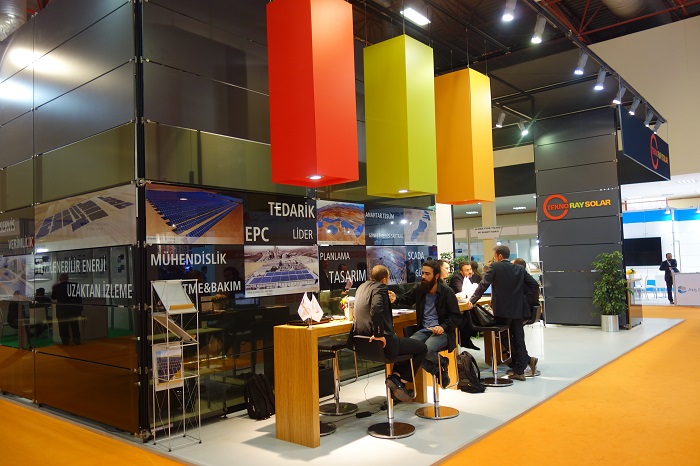On the first day of the trade fair pv magazine spoke to a number of local and international EPC firms. All of them expect PV installations to increase in Turkey in 2017 above the 570 MW added in 2016.
Expectations for annual PV installations this year range from 900 MW to 1.5 GW. Almost all of these additions will stem from the so-called unregulated (unlicensed) segment, i.e. solar systems smaller than 1 MW. The key reason for the expected strong growth this year is the fact that from January 1, 2018 the grid distribution fee will be hiked from currently TRY 0.025/kWh to TRY 0.1025/kWh, effectively lowering the feed-in tariff by almost 20% from $0.125/kWh to $0.102/kWh.
Furthermore, with new anti-dumping duties announced on April 1 ranging between 25% and 35% for modules manufactured in China, the economics of solar projects become considerably more challenging. Unless all the required certificates for the solar project have been issued, the new anti-dumping duties will apply immediately.
Domestic module manufacturing in Turkey this year is believed to be limited to around 300 MW, which means that less than 30% of this year’s projected demand can be sourced from domestic production. This bottleneck, together with the newly introduced anti-dumping duties, has led project developers and EPC firms to double down on their sourcing activities and have made modules manufactured outside of China more attractive once again.
We heard that German module manufacturer Solarfabrik has been able to negotiate a 20 MW supply deal for solar projects to be completed in Turkey this year.
The two biggest cell and module manufacturers in Turkey are in fact both subsidiaries of large Chinese manufacturers: CSUN has 150 MW of cell capacity and 500 MW of module capacity in Turkey, and HT-SAAE, with 300 MW of cell capacity and 600 MW of module capacity, is located in Tuzla. As long as the cells employed are not imported from China, the modules produced at these facilities are exempt from any import taxes or anti-dumping duties.
Yet both of these companies operate in a special economic zone, meaning that 85% of their production is slated to be exported. Given the new market conditions, both companies are considering increasing their supply to the Turkish market, although this would entail giving up some of their current (tax) privileges.
Popular content
Talking to the general manager of the Turkish operations of HT-SAAE, Robin Xi, he disclosed that HT-SAAE is seriously evaluating the option of establishing a second production unit in Turkey that would operate outside of the special economic zone and could thus supply the Turkish market without any restrictions.
Another hot topic at the trade fair is Hanwha Q Cells’ commitment to build an integrated ingot-wafer-cell and module fab in Turkey with an annual capacity of at least 500 MW as a consequence of its successful bid for a 1 GW PV power plant in the province of Konya three weeks ago. While pv magazine had the chance to meet Won Park from Hanwha Q Cells at the trade fair, he explained that further details of their production plans in Turkey would be revealed within the next two months. Even without any local production in place, Hanwha Q Cells believes it had captured 30% market share in Turkey last year.
While short term activity is heating up in the Turkish PV sector as a consequence of regulatory changes, the visibility for next year remains limited. This is not a new experience for players active in the Turkish solar sector, yet it has led to some players to adjust their business strategies in Turkey.
While continuing to build ground mounted systems in the unregulated segment in Turkey, German EPC firm IBC Solar, for instance, is more strongly focusing on expanding its activities to build up a franchise network of local installers trained to address the rooftop market. “We are fully aware that the rooftop market is a niche segment in the Turkish PV market today, yet we are convinced it will be a much more sustainable market segment once it takes off. We want to be an a leading position when this market takes off, and expect to see encouraging results over the next 2-3 years,“ says Bülent Yildiz, CEO of IBC Solar Turkey.
Author: Götz Fischbeck
This content is protected by copyright and may not be reused. If you want to cooperate with us and would like to reuse some of our content, please contact: editors@pv-magazine.com.


By submitting this form you agree to pv magazine using your data for the purposes of publishing your comment.
Your personal data will only be disclosed or otherwise transmitted to third parties for the purposes of spam filtering or if this is necessary for technical maintenance of the website. Any other transfer to third parties will not take place unless this is justified on the basis of applicable data protection regulations or if pv magazine is legally obliged to do so.
You may revoke this consent at any time with effect for the future, in which case your personal data will be deleted immediately. Otherwise, your data will be deleted if pv magazine has processed your request or the purpose of data storage is fulfilled.
Further information on data privacy can be found in our Data Protection Policy.